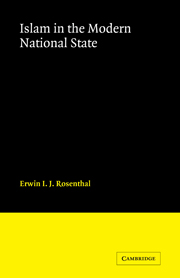Book contents
- Frontmatter
- Contents
- Introduction
- Acknowledgements
- Abbreviations
- Note on transliteration
- PART I CONTEMPORARY ISLAM IN CRISIS AND TRANSITION
- PART II ISLAM IN THE MODERN NATIONAL STATE
- SECTION I CONSTITUTIONAL ISSUES
- 8 The Islamic Republic of Pakistan
- 9 Islam in Malaya
- 10 Some observations on Islam in Iran and Turkey
- 11 Islam in Tunisia and Morocco
- SECTION 2 CHANGES IN LAW AND THE EMANCIPATION OF WOMEN
- SECTION 3 THE PLACE OF ISLAM IN NATIONAL EDUCATION
- Epilogue
- Notes
- Select Bibliography
- Index
11 - Islam in Tunisia and Morocco
Published online by Cambridge University Press: 05 September 2013
- Frontmatter
- Contents
- Introduction
- Acknowledgements
- Abbreviations
- Note on transliteration
- PART I CONTEMPORARY ISLAM IN CRISIS AND TRANSITION
- PART II ISLAM IN THE MODERN NATIONAL STATE
- SECTION I CONSTITUTIONAL ISSUES
- 8 The Islamic Republic of Pakistan
- 9 Islam in Malaya
- 10 Some observations on Islam in Iran and Turkey
- 11 Islam in Tunisia and Morocco
- SECTION 2 CHANGES IN LAW AND THE EMANCIPATION OF WOMEN
- SECTION 3 THE PLACE OF ISLAM IN NATIONAL EDUCATION
- Epilogue
- Notes
- Select Bibliography
- Index
Summary
TUNISIA
Islam in North Africa is sui generis; it arrived thirteen centuries ago as a conqueror and added a new layer of civilisation to already existing ones: Phoenician, Roman and Byzantine which had imposed themselves on the indigenous Berbers who are still here today. Besides, it suffered French occupation in recent times, but benefited by French culture and civilisation. As a consequence, Islam is less rigid today in the Mediterranean area than it was under Almoravids and Almohads. There are many monuments to its valour and prowess, but also to its spirituality. But it has also suffered stagnation over the last two centuries through internal decay and, more lately, foreign domination.
Yet there is a special atmosphere about North Africa, Tunisia and Morocco in particular—the war in Algeria prevented me from visiting it. National awakening and liberation leading to sovereign independence are not unconnected with Islam, both positively and negatively. It appears that nationalism, Maghribī Arab nationalism, has discovered a new relationship to Islam which has preserved its purity despite Maraboutism—the religious orders with their cult of saints and their fanaticism and stagnation. It has crushed Maraboutism and tries to build Islam into its new national character as an important constituent. It is naturally not the medieval Islam with its claim to determine policy and to provide the law of the land. It is rather Islam as faith and/or culture and civilisation.
- Type
- Chapter
- Information
- Islam in the Modern National State , pp. 316 - 331Publisher: Cambridge University PressPrint publication year: 1965
- 1
- Cited by



